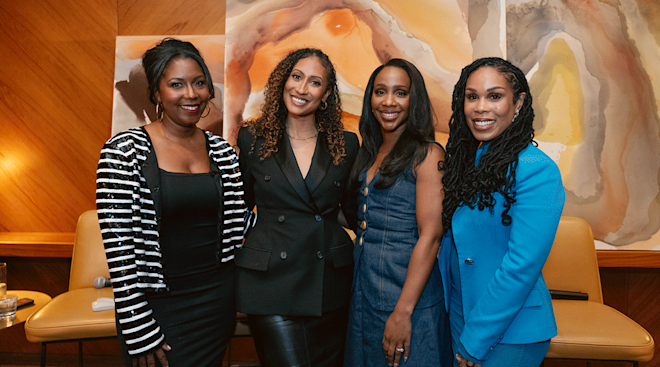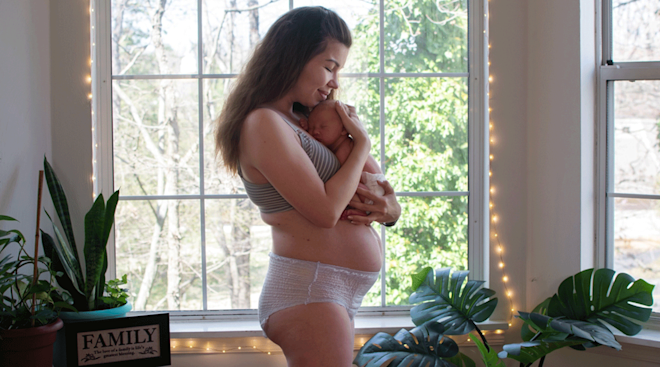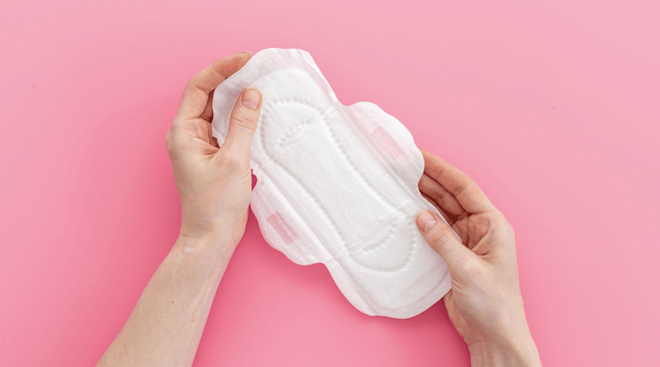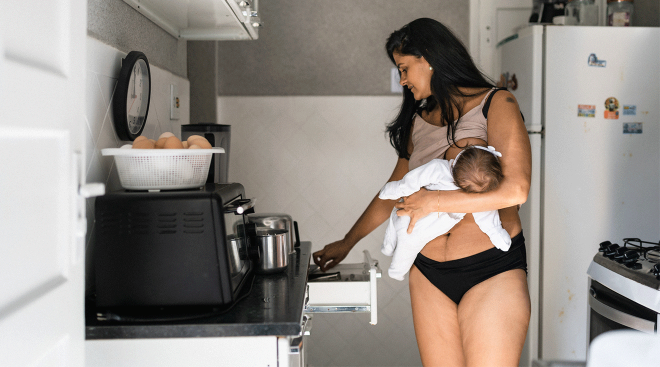How to Line Up Help After Birth—Plus, What Kind of Support You’ll Need
You’ve heard over and over the importance of setting boundaries and focusing on recovery postpartum—but in order to do so you’ll need to make a plan for lining up help after birth. Of course, predicting exactly what kind of help you’ll want in the early days and weeks of the fourth trimester isn’t always simple. So how can you be proactive in your quest for adequate support? “Learn from other parents. Support groups or parent friends can give ‘real talk’ on what kind of help actually made a difference for them,” says Lynn Perkins, CEO and co-founder of UrbanSitter. Ready for a head start on this type of advice? Here, experts and moms share their words of wisdom, plus tips to line up support after birth.
Again, this can be tough to assess before you’re in the thick of it with a newborn. Often, parents will overestimate or underestimate what they’ll need and end up with too much, too little or the wrong kind of help. And when you’re running on little sleep and recovering from childbirth, this kind of miscalculation can seem devastating. So how can you figure it out? Start by assessing your daily needs. “Think about your normal routine—meals, chores, errands—and imagine doing it all on top of caring for a newborn, while recovering and being sleep-deprived,” Perkins says. Also take stock of who you can lean on in your current network, advises Diane Ortega, DNP, CNM, co-founder of the Willow Midwife Centers for Birth and Wellness AZ. You’ll also want to consider factors like what kind of birth you may have (vaginal or C-section), whether your home has stairs and who’ll be able to care for other kids or pets in your family. “Your OB or midwife can offer guidance based on your birth plan and recovery expectations, especially if you’re likely having a C-section,” Perkins says.
It may also be helpful to think about postpartum support in two phases: the early weeks with baby and you return to a regular routine (whenever that is), Perkins says. “Your needs will likely be very different.”
When I was pregnant with twins, my husband and I were trying to figure out what help we’d need when our babies came home. Other moms insisted that we needed a baby nurse… I went with it and hired someone before the babies were even born. After delivery, I stayed in the hospital for nearly a week and my newborns were in the NICU, so I wasn’t able to spend much time with them… Finally, I was thrilled to come home and wanted to spend every second with my new babies and my husband. But it felt weird having a stranger with us in our home at every moment.
A big part of figuring all this out is creating a postpartum plan during pregnancy, with a list of tasks and who will be responsible for each. It can also be helpful to research all the types of help you might need (i.e. lactation consultants, pelvic floor therapists, caregivers and mental health experts), so you have resources at the ready if and when you need them. “If daycare might be in your plan and you live in a competitive area, it’s smart to get on waitlists during pregnancy. But most great nannies are hired weeks or days (not months) in advance, so plan to search closer to your return date,” Perkins says. “You don’t need to lock anything in yet, but it’s helpful to understand what’s out there for part-time, full-time and occasional care. Think of this phase as information-gathering, not decision-making—future you will be grateful.”
As you do your research, think through all aspects of what type of support you might need. It might be caring for baby (help with feeding, changing their diapers and getting them to sleep). Or, it might include help with your own postpartum recovery, including figuring out breastfeeding and building milk supply. Alternatively, you might want help with daily household chores, including cooking, cleaning, dishes, laundry and general tidying up. Whatever it is, ensure you’re tailoring your search accordingly.
Clear communication should always be the gold standard for whatever type of help you hire—but it should also be the gold standard for your family and partner. “Pregnancy and postpartum are physically, emotionally and mentally challenging—sometimes, you don’t have the energy to figure out or communicate what you need,” Ortega says. One way to get ahead of this is by ensuring you’re all aligned and on the same page beforehand. Let your partner know what you need. “Don’t wait until you’re both exhausted to figure things out,” Perkins says. “Talk about what you’ll need ahead of time (think: nighttime shifts, feeding plans and even who’s handling diaper duty).”
That said, understand that at times you might need to specifically ask for exactly what you need. “We need to debunk the myth that this should happen seamlessly. Adults need to say what they need,” says Lisa Spiegel, LMHC, director of Soho Parenting in New York City. “Partners would never run a business without meeting, but we think that our partners should just know what’s needed. It’s about meeting and talking and problem solving together.” Spiegel recommends new parents have a 15-minute meeting each day to check in to talk about what’s going on and figure out what each partner can and should be doing.
We were home after about five days in the hospital and allowed our immediate families to visit the day after we came home. In retrospect, I wish we had waited a few days to have some quiet bonding time with baby at home, and really get the hang of breastfeeding and our new schedule. Don’t be like me! Always feel free to say no to visitors!
If possible, give yourself and your partner a day or two without extra visitors to assess your needs. “Take a few days with the baby and experience what it’s like, and then you can decide what [extra] help will really help you,” adds Spiegel. It’s important to do this so you find a rhythm with baby and have a true sense of what will lighten your load—whether it’s cleaning, cooking or helping take care of baby. “People have so much advice about what women should do, but it’s so personal,” Spiegel adds.
Once you do allow visitors, be strategic about who visits and when. The postpartum period can be a highly vulnerable experience, especially when you’re still recovering down there and perhaps learning how to breastfeed baby. To avoid any added stress, with your recovery needs and comfort levels in mind, consider minimizing visitors in the first few weeks after birth. “The only ones allowed should be ones who are actually there to help, not be entertained,” Ortega says. You can also create a visitation schedule around your rest and bonding periods with baby.
It’s also important to set boundaries with any visitors who do arrive to help out. “It’s totally okay to say, ‘We’d love help with laundry, but please wait to hold the baby until we’re settled,’” Perkins says. “Be kind, be clear and let them know that your needs might shift.”
It might also be helpful to spread out visitors to make it more manageable. “It’s a marathon, not a sprint,” reminds Spiegel. If everyone is planning on coming right after baby’s born, you could find yourself overwhelmed initially and without a soul in sight a few weeks later when you really need more support.
If your instinct is to say “no” when someone offers help, make it a point to start saying “yes.” With a new baby, there’s always a chore waiting to be done, whether it’s laundry to fold, something to be picked up at the grocery store or garbage to be put out. If a friend comes by and offers help, give them a task. You’ll be grateful to scratch something off your to-do list, and they’ll feel good about being able to support you. “Sometimes self-care looks like a nap instead of a load of laundry, or a shower while someone else rocks baby,” Perkins says. “Take the help, say ‘yes’ to rest.” In return, snap a “thank you” photo for baby in the clothes they helped wash or fold. “It can go a long way in keeping everyone feeling valued,” Perkins adds.
I was oddly competitive about caring for baby in the early days at the hospital and at home with my firstborn. I needed to change every diaper, do every feeding, clean every bottle, get every burp out of baby. All this while I was in a significant amount of discomfort. I wanted to soak it all in and relish these 'firsts.' But, instead, I burned myself out and perpetuated my physical pain by doing too much, too soon. With my second and third kiddos, I let the nurses at the hospital do all the things. I let my littles sleep in the nursery between breastfeeding sessions. I had my husband and mom alternate diaper changes. I took friends up on food-delivery offers. I called in favors. I hired house cleaners. I did less so that I could enjoy more.
If you don’t have family or friends who can help and you can afford it, you may want to consider hiring a postpartum doula or nanny to lend a hand. “A good postpartum doula not only provides support, care and education for new parents, but can help partners and visiting family members by building their skills and confidence in newborn care,” says Meema Spadola, PCD, CLC a certified postpartum doula and lactation counselor in New York City. To find a postpartum doula in your area, you can get recommendations from friends and family, or use the finder tool on the DONA International website.
A live-in nanny or newborn night nurse can also help parents care for their newborn, as they can stay in a family’s home 24/7, depending on everyone’s preferences. Many new parents use them for a short period of time (two weeks, a month, etc.) so they can get some sleep at night. If you think you may want to hire a paid caregiver, you can interview candidates while you’re still pregnant and narrow the field before baby is born. “A postpartum doula, night nurse or lactation consultant can feel like a luxury, but even short-term help can be a game-changer,” Perkins says. “Sometimes just a night or two of extra support is enough to reset and recharge the whole household.”
Your employer may also offer childcare benefits that cover backup care, nannies or postpartum leave support, Perkins adds. “Don’t be shy about asking.”
Remember self-care and accept help when offered. Be flexible, as your needs may change after baby arrives.
“Your needs will shift (sometimes daily),” Perkins says—not to mention the roller coaster of emotions you’ll experience postpartum. This is why releasing any self-judgement and having a list of people to support you or a paid caregiver waiting in the wings can really help. “The people who love you are there to support you, even if things look different than you expected,” she adds. “Whether it’s a longtime friend, a local parent group or a comforting corner of Instagram—find your people. Let them lift you up.”
Plus, more from The Bump:
Diane Ortega, DNP, CNM, FACNM, is a certified nurse midwife and co-founder of the Willow Midwife Centers for Birth and Wellness AZ. She received her master’s degree from the University of Illinois-Chicago and has been in practice for 13 years, delivering more than 1,000 babies.
Lynn Perkins is the CEO and co-founder of UrbanSitter. She started the website in 2011 after she found herself and her community struggling to find high-quality childcare they could trust. She earned her bachelor’s degree from Stanford University.
Meema Spadola, PCD, CLC, is a certified postpartum doula and lactation counselor in New York City with over 19 years of experience. She earned certification from Doulas of North America (DONA).
Lisa Spiegel, MA, LMHC, is the director of Soho Parenting, a support center for parents in New York City. She earned her master's degree in developmental psychology from Columbia University and has over four decades of experience working with adults and kids.
Learn how we ensure the accuracy of our content through our editorial and medical review process.
Navigate forward to interact with the calendar and select a date. Press the question mark key to get the keyboard shortcuts for changing dates.





















































